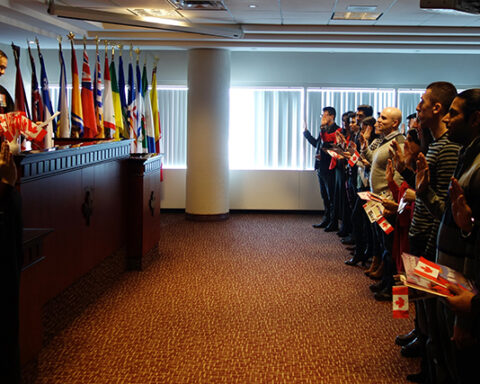Citizenship and Immigration Minister Chris Alexander’s proposed revisions to the Citizenship Act are largely directed at “citizens of convenience.” Measures such as a longer required residency period to qualify for citizenship (from three years out of four years to four years out of six; a minimum period of 183 days in four of those years; and no longer counting time as a non-permanent resident towards citizenship), along with clarity that this means being physically present in Canada, target citizens of convenience.
But Alexander not only wants to ensure that applicants “play by the rules” during their citizenship application, he wants them to sign an “intent to reside” commitment. This is largely symbolic, as the intent needs only to be expressed while applying for citizenship, not after citizenship is granted. In other words, a new citizen could move outside Canada, for professional or personal reasons, without penalty, once granted citizenship.
But how do we define citizens of convenience? Some cases are more obvious than others. The following scenarios may be helpful.
Ambiguous cases
Gao Wenzhong arrived in Canada from Hong Kong with his wife Liyou and two pre-school age children, Xiao Gao and Gao Youyin. He continued to manage his Hong Kong business from Canada. After six years, he met the residency requirements and became a citizen. Gao then moved back to Hong Kong to expand his business. Liyou stayed behind to look after the children until they finished high school. His children remained in Canada for university but pursued work in China following their graduation. Other than a few trips back to Canada to visit his family, Gao remained in Hong Kong.
Gao could be deemed a citizen of convenience as he did not reside in Canada after he became a citizen, although his family remained in Canada.
What about his wife who resided for another six years post-citizenship? What about his children who resided for another 10 years post-citizenship?
Consider Farideh, who arrived in Canada from Iran at the age of eight and became a Canadian citizen, along with her parents and siblings at the age of 14. After completing high school and an undergraduate degree over the next eight years, she moved to the U.S. for post-graduate studies. Following completion of graduate school, she was hired by a U.S.-based multinational company, married a U.S. citizen, and spent the next 20 years taking a variety of international assignments. She never worked in Canada and ended up retiring in the U.S.
Has Farideh’s long absence and lack of post-citizenship residency made her a citizen of convenience? Would her situation change if one of her assignments was in Canada?
Unquestioned citizenship
Ahmed is originally from Pakistan and has been working in Dubai for five years, along with his wife, Leila, and their one child, Fatima. They immigrated to Canada, and six years later, all become citizens. Given better career prospects in Dubai, and the fact that his employers would pay him more as a Canadian than as a Pakistani expatriate, the family, now with a Canadian-born second child, Noor, move back to Dubai and have minimal connection with Canada.
Ahmed, Leila, Fatima and Noor would all appear to be citizens of convenience. But as Noor was born in Canada, her citizenship is unquestioned.
In another scenario, Mahtab and her husband Harbin immigrated from India in their 20s. After becoming Canadian, Mahtab’s mother became seriously ill. Mahtab travelled back to India to look after her mother and unfortunately, after a long extended illness of two years, her mother died. Following the funeral, Mahtab returned to Canada.
Mahtab should not be considered a citizen of convenience given the relatively short period of absence from Canada.
Finally, Giovanni and Maria immigrated to Canada with their respective parents as children from Italy. After being raised in Canada, living in Canada for their entire working life, and raising a family, they decided to retire back in Italy, their country of origin. Given their length of time in Canada, they should not be considered citizens of convenience.
Defining citizenship
These scenarios are illustrative and indicate that while some situations are unambiguous (i.e. Gao, Ahmed and family), others are less so. Fortunately, the proposed “intent to reside” provision is not enforceable once someone becomes Canadian. People may commit to one course of action but circumstances change or new opportunities emerge. We do not have reliable ways to know whether the “intent” is serious or not.
Fortunately, the proposed “intent to reside” provision is not enforceable once someone becomes Canadian.
Coming back to the starting point: how should we interpret “citizens of convenience” under the proposed revisions to the act?
Is it only time away from Canada following becoming Canadian that counts? Or should the reasons for being away from Canada also be a consideration? Examples include:
- Someone working abroad for a Canadian or a non-Canadian firm
- Someone working for an international organization like the UN, WTO or non-governmental organization
- Someone moving abroad to accompany a spouse
- Someone moving abroad for study
- Other contributions to Canada
While theoretically the government could, with expanded exit controls and database tools, know who is complying with “intent to reside,” this would be extremely intrusive into the private lives of citizens. From a policy perspective, the above scenarios and questions illustrate just how difficult it would be to come up with clear and predictable regulations, except in the most straightforward situations. From an operational perspective, regulations would be largely unworkable as CIC has enough of a challenge delivering the current program.
From a policy perspective, the above scenarios and questions illustrate just how difficult it would be to come up with clear and predictable regulations, except in the most straightforward situations.
The tightened residency requirements address the issue of citizens of convenience.
From a “meaningfulness” of perspective, the requirement for physical presence during the waiting period provides an imprint of Canadian life (good or bad). After that, life and circumstances will dictate the choices people make, with governments largely powerless.
Citizenship policy reflects a compromise between increasing the meaningfulness of citizenship (or value, in Alexander’s words) and facilitation, making it easier for immigrants to integrate into Canadian society. As Canada continues to try to attract more skilled and educated immigrants, it is likely that many of these may have a more instrumental view of citizenship, given increased economic and other opportunities.
Citizenship policy reflects a compromise between increasing the meaningfulness of citizenship (or value, in Alexander’s words) and facilitation.
By coming down firmly on the side of meaningfulness, Alexander has sent a strong signal against citizens of convenience, but a signal that may make Canadian citizenship less attractive to some of the more highly sought after immigrants. Given an overall tendency among developed countries tightening citizenship, this may not significantly affect Canada’s immigration competitiveness. However, given the time lag involved in implementing citizenship changes, we will not know the full effect of these changes for a decade or more.
Andrew Griffith is the author of Policy Arrogance or Innocent Bias: Resetting Citizenship and Multiculturalism. He is the former Director General for Citizenship and Multiculturalism at Citizenship and Immigration Canada (CIC). He has worked at Canadian Heritage, Service Canada, Industry Canada and Privy Council Office, in addition to Foreign Affairs and International Trade Canada, where he had a number of domestic and international assignments.
Andrew Griffith is the author of Multiculturalism in Canada: Evidence and Anecdote, Policy Arrogance or Innocent Bias: Resetting Citizenship and Multiculturalism and many other works. He is a former Director-General of Citizenship and Immigration Canada, Citizenship and Multiculturalism branch. He regularly comments on citizenship, multiculturalism and related issues, in this blog and the media.





